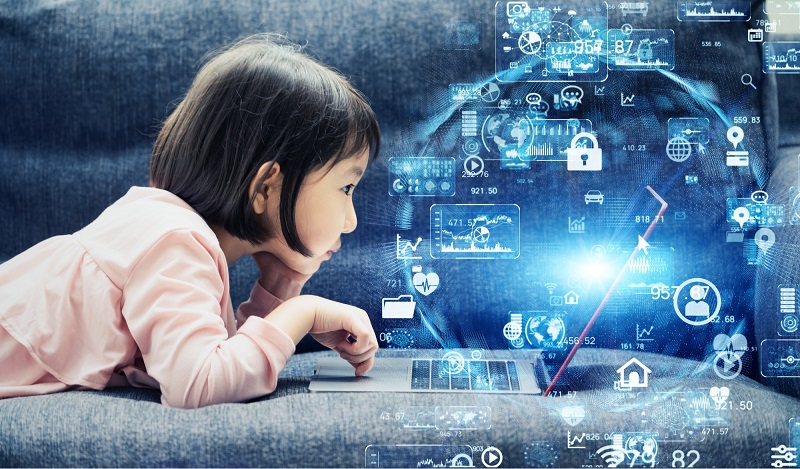
25 Mar What are Edtech and the future of education
Education has remained relatively the same already more than a century and technology has come to change this and very quickly. So what exactly is tech education? Or among other words, what is Edtech?
To begin with, we are going to try to explain what the concept of Edtech means. The term comes from English Education Technology and is the practice of introducing technological tools in education to create a more attractive learning experience. In it, we can include the simple use of computers in gamification and virtual reality. Today’s classroom education is fused with ipads, tablets, interactive courses, apps (educational applications), interactive online courses, and even robots that help children learn languages.
Edtech has always existed, but it is now that its growth has been exponential, not because we were ready, but because in this digital age we have seen ourselves in need. However, edtech is not only about digitizing books, it is about applying technology to offer a new learning architecture. The influence of these technological tools is changing education and training, making it easier for students and teachers to stay involved through fun and alternative ways of learning, offering personalized training, and using big data to understand each student’s progress.
The objective of Edtech is, neither more nor less, than to improve education, improving the learning and teaching processes. We cannot be afraid of it, nor think that it will replace the primary role that an educator has, if not quite the opposite, this type of technological tools provide teachers and instructors with more means to achieve an improvement in the educational strategy and take better advantage of it. their resources.
Some examples of edtech media:
- Robotics in the classroom teaches the little ones different programming languages and even how to make them. There are also robots that teach and complement face-to-face teaching with subjects such as music, languages , and even the human body.
- Artificial Intelligence in e-learning allows you to personalize the lessons according to the abilities of each student, detecting in the learning process, the points of improvement and aptitudes of each student, using in some cases cognitive neuroscience to obtain individual results.
- Virtual Reality in education opens to the student a world of possibilities without even leaving his desk.
We know that the way you learn and interact is individual, everyone learns at their own pace and in their own style, and edtech tools facilitate the creation of learning experiences that foster learning capacity. This potential for scalable learning has played an important role in the rise of edtech and it seems to have come to stay and we are entering the new era of education.
Edtech benefits for students and teachers
- Greater communication and collaboration between all students and the student and their teachers.
- Availability of content 24/7, access to learn at any time.
- Flipped ClassRoom, allowing the student to see the contents and then discuss them with their teachers.
- Personalization of the contents. In the case of videos, the student who finds it more difficult to learn has the possibility to stop the video and watch it until they understand, unlike other students who may only need to watch it once. With analytics, instructors can see what has cost students more to reinforce that knowledge.
- Instead of a single exam, educators can continually assess the student.
Edtech benefits for teachers
- Self-evaluations, which consist of automatically reviewing tests and exams.
- Digitized management of student data. As automatic reminders to parents of students about homework, recommendations, etc … creating a more collaborative environment.
- Paperless classrooms.
- Applications that allow detecting weaknesses and strengths of certain skills and knowledge of the students.
Edtech benefits for society
- Cost reduction in schools, academies, and in the budget for education since traditional educational systems are inherently inefficient. This cost reduction allows you to invest money in more personalized education, with innovative digital content that improves results.
- The impact of teaching is increased since the integration of multimedia applications, gamification, mobile learning, or what is also called mobile learning, LMS, learning platforms, virtual reality, etc. makes the content increasingly immersive, designed to attract students and keep them engaged until the end.
- Creating a stronger link between what happens in reality with what is taught in the classroom, creating experiences where the student can interact physically and emotionally.
- The democratization of education and standardization of content. The importance of edtech lies not only in the power to engage students in a new and innovative way but also in the possibility of equalizing standards and allowing access to all, not only allowing low-resource schools to content from schools with more resources, from developing countries accessing content from developed countries.
- Creating an economy of knowledge since training and education throughout our lives is essential for our personal economic development and as a society, without it we lose the ability to develop qualified workers and build competitive advantages as individuals and as nations and for this we must ensure the innovation, effectiveness, and efficiency of our learning systems.
By changing this traditional architecture of education, Edtech has the power to reduce costs, allow new and different levels of standardization, and create new and better process efficiencies. It is clear that Edtech is destined to transform the future of education, of how education has resources, it is taught, it is learned and the results it can produce, both for the individual and for society in general as we continue to build the knowledge economy.
